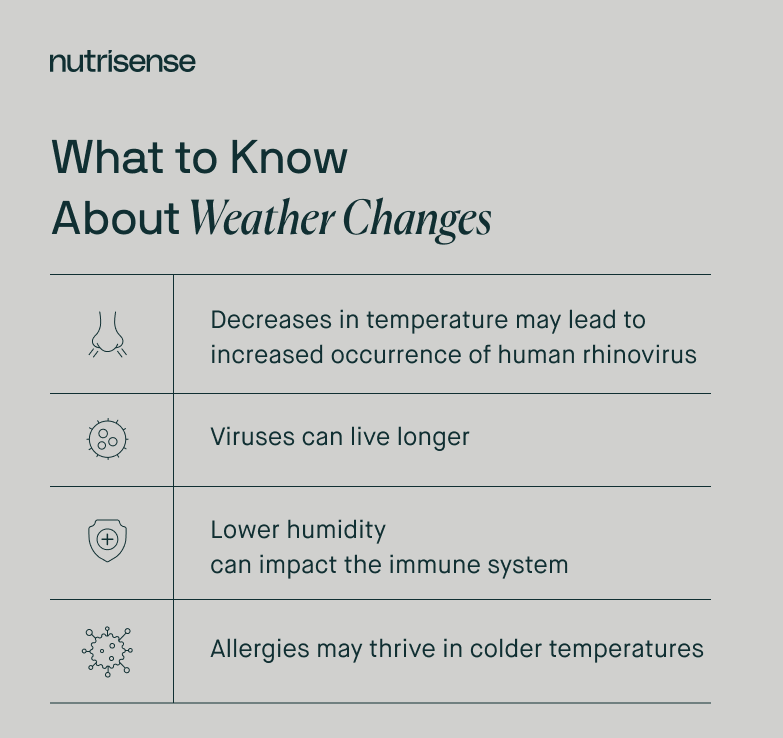Can a Change of Weather Make You Sick?

Key Takeaways
You have probably heard that going outside in the cold with wet hair, or sleeping with the window open can make you sick. These rumors have been around for centuries, but is there any truth to them?
Flu season does tend to coincide with colder months and temperature changes, and most people get colds in the winter. So what is it about this time of year and sudden changes in weather that can lead to sore throats, coughing, and runny noses?
Read on to learn more about the connection between cold weather and common illnesses.
Does Weather Change Impact Your Health?

Studies show that there are certain factors that can make it easier to get sick, especially during the weather changes and colder temperatures that happen in the wintertime. Let’s take a deeper look at why you may get sick as the seasons change.
Decreases in Temperature
A decrease in temperature and humidity is associated with an increased occurrence of human rhinovirus, or HRV, infections. Worldwide and year-round, HRV infections are responsible for more than half of cold-like illnesses and upper respiratory infections like the common cold, pneumonia, bronchiolitis, and sinusitis.
So, why might you be more likely to get sick in the cold months? There are a few possible reasons. First, less humidity can lead to the cooling and drying of the respiratory tract. Inhaling drier air can dry out your mucosal membrane, which lines your nose, mouth, esophagus, and lungs. This can make you more susceptible to infection.
Cold air also cools the surface of your body, which can also cause a restriction in the blood vessels of our nose and upper airways, which can inhibit our respiratory tract’s defense system.
Viruses May Live Longer

One reason for an increase in illnesses in cold weather is that viruses can actually live longer in cooler temperatures.
The influenza virus that causes the flu, for example, is covered in an outer membrane that is made of lipids. Research shows that this outer membrane solidifies into a gel at temperatures slightly above freezing and below. At warmer temperatures, the gel melts into a liquid.
When the virus has its solid outer coating in the colder months, it is able to withstand cold temperatures and travel easier from person to person. When its outer coating is liquid, the virus is likely unable to protect itself against the elements.
Allergies May Thrive
Cold weather may also increase the symptoms of seasonal allergies. If you have a pollen allergy, a cold front can carry pollen in the air from other areas.
Temperature drops can also cause humidity to drop, drying out the nose. This may lead to irritation and worsened allergy symptoms for some people. If you live in an area that has a lot of rain in the winter, like the Pacific Northwest, allergies can also be exacerbated by wet, rainy days.
Other research shows that cold weather can narrow your respiratory airways and inflame the lining of your respiratory system, which can aggravate both allergy and asthma symptoms.
Lower Humidity Can Impair Immune Defenses

Increased virus outbreaks often correspond to a decrease in humidity. This is partly because viruses can be transmitted easier in dry weather, but also because our immune response is weakened by lower humidity.
Animal studies have shown that inhaling dry air can impair mice’s innate antiviral defense, though exactly why remains unclear. Dry air also irritated the tissue of the mice’s respiratory system, enhancing viral spread throughout the body, and leading to more severe infections.
Viruses Can Spread Faster Indoors
Another reason for a higher likelihood of illness in cold weather is that we tend to spend most of our time indoors, which can enhance the spread of infectious diseases such as the flu virus. This may be especially true for crowded indoors gatherings, like holiday parties.
Who Is More At Risk for Getting Sick?
Certain populations are shown to have a higher risk of getting sick. Here are some groups who may have a weakened immune system:
People Over the Age of 65
As you age, your immune system ages with you. With time, you may lose your ability to protect yourself against infections, heal wounds, and fend off illnesses. This is partly because the body’s production of B and T cells declines, which are lymphocytes—white blood cells that are an important part of our immune system.
B cells produce antibodies that attack invading bacteria, toxins, and viruses, and T cells destroy the body’s own cells that have been taken over by viruses or cancer. Decreased production of these lymphocytes as you age can severely impair your immune system.
At the same time, your innate immune system amps up, which can cause inflammation that damages tissue and leads to disease.
People With Chronic Diseases

People who already have chronic diseases are often immunocompromised, meaning they are living with weaker immune systems. Autoimmune diseases like lupus, type 1 diabetes, and rheumatoid arthritis, can turn the body’s immune system against healthy tissues and cells.
Health conditions like asthma can cause your body to dangerously overreact to harmless substances. Other diseases, like leukemia or lymphoma, negatively affect white blood cells, which are needed for the immune system to respond to infections.
Treatments for chronic diseases can also weaken the immune system. Cancer treatments can damage the immune system as it destroys cancerous cells. Treatments for autoimmune diseases actively try to suppress the immune system to keep it from attacking healthy cells.
Long-term use of certain medications, like corticosteroids and disease-modifying antirheumatic drugs, can limit your body’s ability to make antibodies that fight infections. A bone marrow transplant, often a treatment for some types of cancer, can temporarily lower your white blood cell count, weakening your immune response.
Children Under the Age of 5
Children under the age of 5 may have an increased risk of illness because their immune systems are still developing. Children are also more likely to put their hands in their mouths, spend more time outdoors, and have more contact with others. Each of these things may make it more likely to get and spread illnesses such as viruses.
Tips for Staying Healthy During Weather Changes

As you’ve seen, your chances of getting sick may increase in colder weather. Luckily, there are a few things you can do to mitigate this risk. Here are some tips for staying healthy during cold weather.
Layer Up in Colder Weather
Learning how to layer properly is one key to staying warm. Start with a base layer, like long underwear, which will wick sweat off your skin. Keeping your skin dry is important for avoiding chills and hypothermia.
A middle layer, such as an insulated down jacket, can help you retain body heat to protect you from the cold. And an outer layer such as a rain jacket can be a great way to protect yourself from wind and rain.
Even if you don’t think you’ll need all three layers, it’s a good idea to always bring them with you. If you’re too warm, you can shed layers. But if you end up colder than you think, you won’t be able to add layers that you didn’t bring with you.
Drink Plenty of Water

Don’t skimp on hydration in the winter months: your immune system needs water to function properly and effectively. The Mayo Clinic recommends consuming about 15.5 cups of fluids per day for men, and 11.5 cups of fluids per day for women, including fluid from water, food, and other beverages.
In fact, about 20 percent of your fluid intake may be from food. Monitoring urine color may also be one of the best ways to assess your hydration, especially if you do more physical activity that may require hydration above the recommended amounts above.
Water is the best way to stay hydrated, but fluids like milk, herbal teas, and even coffee count as fluids too.
Eat a Healthy, Balanced Diet
Good nutrition is crucial for the functioning of your immune system. This is also true for when you do happen to be sick—when your immune system is actively fighting infection, your body needs more energy.
Certain nutrients, like vitamin A, zinc, and arginine, have specific roles in developing and maintaining your immune system. Protein-rich foods like seafood, eggs, poultry, soy, and legumes are good sources of zinc and arginine.
Vitamin A in its provitamin form (carotenoid) is found in green leafy veggies, fruits, orange and yellow vegetables. Preformed vitamin A (retinol and retinyl esters) is found in dairy products like milk and cheese, egg yolks, and certain types of fish, like herring and salmon.
In most, but not all cases, carotenoid sources must be converted to the retinol and related forms in order to be active in the body. There can be some genetic reasons or other factors why some people may have more difficulty converting carotenoids to retinol.
Sleep 7 to 9 Hours a Night
Good, healthy sleep is also important for the functioning of your immune system. The amount of sleep you need every night varies from person to person.
Sleep needs can depend on your age, the quality of the sleep you usually get, and whether or not you have experienced sleep deprivation before. In general, healthy adults should aim to get at least seven to nine hours of sleep a night.
Wash Your Hands Thoroughly

Washing your hands properly can help prevent infections. It can help keep germs out of your nose, eyes, and mouth, which we often touch with our hands without even noticing. Proper handwashing can also keep germs out of food, and off of surfaces and objects.
Wash your hands often, especially:
- Before, during, and after preparing food
- Before and after eating food
- Before and after caring for someone at home who is sick, especially with vomiting or diarrhea
- Before and after treating a cut or wound
- After using the toilet
- After changing diapers or cleaning up a child who has used the toilet
- After blowing your nose, coughing, or sneezing
- After touching an animal, animal feed, or animal waste
- After handling pet food or pet treats
- After touching garbage
Exercise Daily
Daily physical activity can have an important impact on many aspects of your health, including our immune systems. Moderate-intensity exercise, especially, is shown to stimulate cellular immunity.
Studies show that people who exercise regularly have a lower incidence of illness, lower intensity of symptoms when they do get sick, and a lower instance of mortality from viral infections.
Find the right Nutrisense programto turn insight into progress.
Go Beyond Glucose Data with Nutrisense
Your glucose can significantly impact how your body feels and functions. That’s why stable levels are an important factor in supporting overall wellbeing. But viewing glucose isn't enough. Nutrisense, you’ll be able to learn how to use your body's data to make informed lifestyle choices that support healthy living.
One-to-one coaching
Sign up to access insurance-covered video calls to work with a glucose expert: a personal registered dietitian or certified nutritionist who will help tailor your lifestyle and diet to your goals.
Monitor and measure what matters
With the Nutrisense CGM Program, you can monitor your glucose with health tech like glucose biosensors and continuous glucose monitor (CGM)s, and analyze the trends over time with the Nutrisense App. This will help you make the most informed choices about the foods you consume and their impact on your health.
Find your best fit
Ready to take the first step? Start with our quiz to find the right Nutrisense program to help you take control.

Heather is a Registered and Licensed Dietitian Nutritionist (RDN, LDN), subject matter expert, and technical writer, with a master's degree in nutrition science from Bastyr University. She has a specialty in neuroendocrinology and has been working in the field of nutrition—including nutrition research, education, medical writing, and clinical integrative and functional nutrition—for over 15 years.


.webp)

